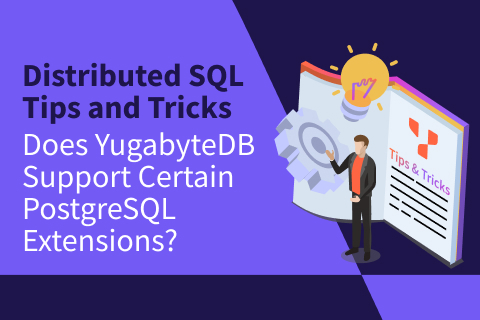Does RocksDB scaling limitation have an impact on YugabyteDB?
There are third party users and blogs that claim that RocksDB does not scale well due to some sizing limitations on its data set size. However, this does not impact YugabyteDB.
YugabyteDB’s physical database implementation of DocDB is based off of RocksDB. However, we have made significant improvements to ensure that node density and scalability are two of our top benefits. In YugabyteDB, each tablet (shard) has its own RocksDB instance. This limits the tablet size to 10GB by default. If it grows beyond that, we automatically split the tablet. That being said, however, a tserver, which makes up the data layer and hosts every tablet on the node, can run hundreds of tablets given the proper amount of CPU and memory resources. Given the above there is no need to limit the amount of data per node.
To learn more about sharding with YugabyteDB and the ideal number of tablets and tablet size, read Distributed SQL Sharding: How Many Tablets and What Size. For those interested in getting deeper into the weeds of how auto-sharding works, check out Franck Pachot’s new blog, YugabyteDB Auto-Sharding.
Discover More Tips and Tricks
A library of distributed SQL tips and tricks and general “how to” information can be found by searching the YugabyteDB blog, as well as our DEV Community Blogs. Some recent “how to” highlights include:
- How to Optimize Pagination for Distributed Data While Maintaining Ordering
- How to Build an Interactive Data Analytics Dashboard in Microsoft Power BI Using YugabyteDB
- How to Avoid Hotposts on Range-Based Indexes in Distributed Databases
- How to Set Up a Mechanism to Capture pg_stat_statements in a Persistent Table
- Stream Data to Amazon S3 Using YugabyteDB CDC
Events and Training
Check out the upcoming YugabyteDB events, including all training sessions, conferences, in-person and virtual events, and YugabyteDB Friday Tech Talks (designed for engineers by engineers).
In addition, there is some extremely popular “how to” content on the YugabyteDB YouTube channel.
If You Have Questions About Distributed SQL
This blog series would not be possible without the support of fellow Yugabeings such as Denis Magda, Dorian Hoxha, Franck Pachot, and Frits Hoogland, to name a few. We also thank our incredible user community for not being afraid to ask questions.
If you have questions, make sure to ask them on the YugabyteDB Slack channel, Forum, GitHub, or Stack Overflow. For more tips and tricks, check out our Distributed Tips and Tricks archive.
Next Steps
Ready to start exploring YugabyteDB features? You have some great options to get started. Run the database locally on your laptop (Quick Start), deploy it to your favorite cloud provider (Multi-node Cluster Deployment), sign up for a free YugabyteDB Managed cluster, or request a full-featured trial. It’s easy! Get started today!


